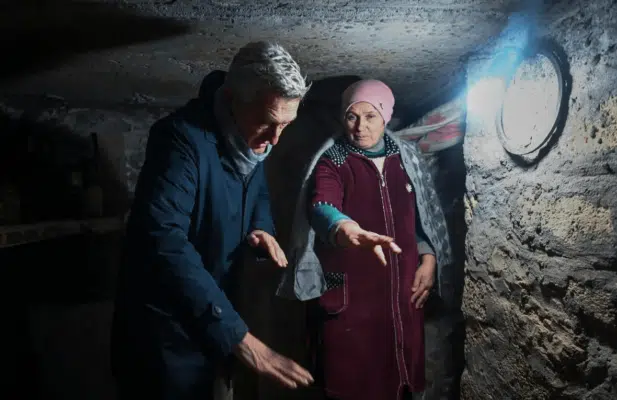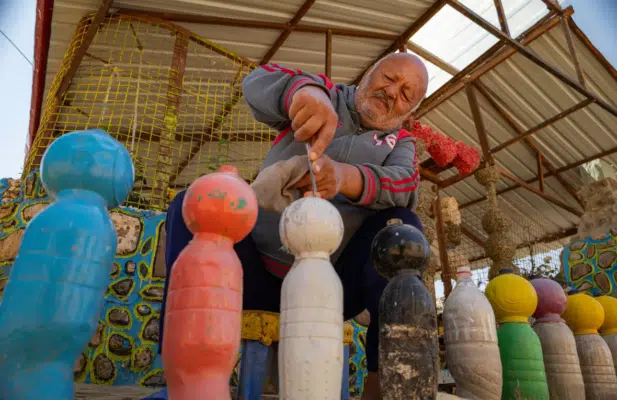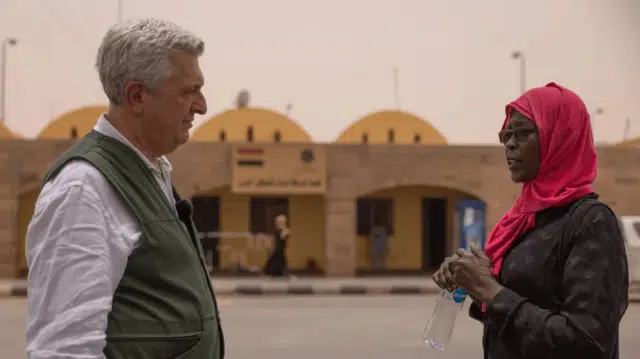We are here for the seventh time in Brussels.
I have asked myself what has changed for the Syrian people since this Conference last convened. Sadly the answer is not positive.
Poverty is deepening in Syria and across the region. Protection space for refugees is shrinking. Tensions are rising between refugee and host communities.
You have heard from other speakers this morning about the devastating conditions inside Syria, including for the more than 6 million internally displaced people. I visited Syria just after the earthquake, including areas in the North-West, newly accessible thanks to the welcome re-opening of two more crossing points.
What I saw was desperate. I met mothers who – while still so dignified and strong – had lost everything. In 25 years of visiting Syria, I have never seen such levels of poverty.
And despite the remarkable efforts of the host countries – Egypt, Iraq, Jordan, Lebanon, and Türkiye – over 6.8 million Syria refugees continue to experience extraordinary levels of suffering. They – and their hosts and the host communities – have been hit hard by factors outside of their control, by global shocks. As we have heard from the host country delegations this morning, one after the other, the patience of host communities is being stretched day after day after day.
This is simply not sustainable.
I call on all donors with the means – please – to continue to contribute to the response. We have seen what happens when the windows to hope and opportunity look to be closing. There are consequences – there will be consequences – for the region and beyond.
And while inclusion, opportunities and much, much more support is needed, we also know that the solution for the refugee crisis cannot be found or resolved in the five host countries alone. The crux of it lies in Syria, where we must also focus efforts.
But, as UNHCR’s recent surveys of refugees show, very few – as many of you have noted – are returning or plan to return in the coming year. They have concerns with security; with regaining their property; with conscription; and other important protection issues that need to be addressed in Syria.
UNHCR continues to engage with the Government of Syria, underlining that for refugees to decide to return they must be confident that it will be in safety and dignity. The main responsibility for taking the concrete steps necessary to build that confidence lies with the Government of Syria.
UNHCR continues to work in areas of our expertise to address these protection concerns inside Syria. We continue to dialogue and will continue to dialogue with the Government as we look to expand predictable and flexible humanitarian access and further scale up efforts across the country. Our presence of course, especially UNHCR presence, is another confidence-building aspect for refugees.
However, and this is the other side of equation, refugees also tell us that they are hesitant to return because of the living conditions inside Syria. No matter how hard living conditions in host countries may be, who would return when there is no shelter, no schools, and no way to provide for their families?
I understand the complex discussions around reconstruction. But much, more can and must be done to provide at least humanitarian and early recovery support inside Syria, including in areas where internally displaced Syrians and small numbers of refugees are already returning.
Commissioner,
There are currently political initiatives in progress – and we have heard about them today – which, if we engage with them constructively, may lead to positive changes inside Syria. The Office of the Special Envoy continues to pursue a path towards a political solution in line with Security Council Resolution 2254.
A number of regional initiatives are underway which similarly seek to break the political deadlock.
UNHCR will continue to follow closely how these evolve and whether and how they may eventually lead to some solutions, including for refugees.
The issue of refugee return is often mentioned in the context of these initiatives. In this respect, we encourage these initiatives to be grounded in international standards and refugees’ concerns, and to help these pursue the necessary guarantees – and this is the crux of the matter: safeguards and conditions inside Syria that could give refugees the confidence to decide to return.
How do we move forward?
First, we need to recognize the enormous contribution that has been made both by hosts and donors over more than a decade. I also recognize that this has come at a cost, in different ways, for each of you. I thank you for your action and generosity.
Second, and building on that, I appeal for the continued respect of international refugee standards and the protection of those who have fled Syria. In some countries, refugees are increasingly afraid because of anti-refugee rhetoric and unsettled by calls that they should return home now. I recognize the frustration and valid concerns expressed by host countries, having hosted millions of Syrians for so long. But we need to move forward calmly, and – this is an appeal to everyone around the issue of refugees – we must move forward calmly and constructively, in a manner that will protect both the interests of host communities and the rights of refugees, and make solutions truly sustainable.
Third, even amidst the global, and domestic, challenges, I appeal to donors in particular to stay the course and fund the appeals. The HRP inside Syria of course, but also the Refugee and Resilience Response Plan – the 3RP – coordinated by UNHCR and UNDP, which serves over 13.5 million Syrians and host communities across the region. I am very worried – and I share the worries of the Ministers of Jordan and Lebanon and other speakers this morning – about the declining funding trends and outlook for this year which may have, as I said, serious repercussions in the region and beyond, including, I am sad to say, further movements of refugees.
Fourth, we need to expand resettlement and complementary pathways. Globally, we nearly doubled resettlement last year over 2021; a trend that I hope will continue. I welcome indications made by States to resettle Syrian refugees and encourage more places and faster departures.
Fifth, we need to bring in more bilateral and development assistance to host countries. Great progress has been made with the World Bank and other international financial institutions over the years, but I am certain that even more can be done; and to provide longer term and predictable support to the host governments.
Before I close, please let’s all continue to listen to refugees; to what they want for their families and their futures. To prioritize them and their wishes. Most of them continue to tell us that they want to return, but much more work – by the Government of Syria and by the international community – is required to make that happen.
This conflict may be growing old and solutions may take time to find, but the urgency and efficacy of our work must not be slowed and it must not falter. The future and stability of the region and beyond are at stake. And most importantly, the lives and hopes of millions are on the line.
Thank you.
Originally published by UNHCR on 15 June 2023.





